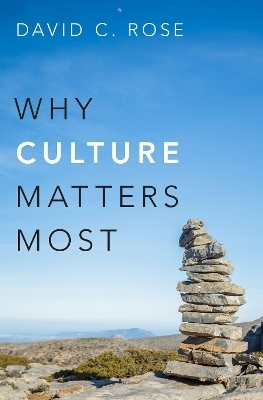
Why Culture Matters Most
Oxford University Press Inc (Verlag)
978-0-19-933072-0 (ISBN)
The key to achieving mass flourishing is culture - not genes, geography, institutions, or policies.
In this thought-provoking book, David C. Rose argues that societal success depends on overcoming the challenge posed by rational self-interest undermining the common good. General prosperity requires large group cooperation, which requires trust, and yet as societies grow larger it becomes more difficult to sustain a high trust society. Culture uniquely addresses this problem by aligning individual interests with the common good, thereby addressing the empathy problem and the greater good rationalization problem. Culturally transmitted moral beliefs can sustain large group trust are akin to commonly owned asset by members of society and like any commons are subject to problems of abuse and neglect.
These problems are apparent in all societies, and Rose highlights a dilemma: while human flourishing requires the general prosperity that comes from a free market system and it requires freedom that depends upon democratic institutions, there is a danger of redistributive and regulatory favoritism that undermines trust in the system generally. This can lead to political tribalism that is shown to reduce trust in the democratic system. This tension has implications for social, political, and economic development.
Cultural beliefs - specifically moral beliefs - are more important than cultural practices or institutions for building a high trust society because when trust producing moral beliefs are well ensconced, trust producing institutions and practices naturally follow. Culture also matters instrumentally because childhood instruction, a hallmark of culture, helps overcome the irrationality of adult individuals choosing to have moral beliefs that they know will limit their ability to promote their own welfare at the expense of the common good in the future. The analysis has surprising implications for the family, religion, government, and the stability of western free market democracies.
David C. Rose is Professor of Economics at the University of Missouri-St. Louis. He received his Ph.D. in Economics from the University of Virginia. He has published scholarly articles on a wide range of topics in economics, including behavioral economics, economic ethics, the theory of cooperation, and the theory of the firm. He has also published in the popular press on a wide variety of policy issues. He has also published an Oxford University Press book titled The Moral Foundation of Economic Behavior.
Preface
Acknowledgements
1. Introduction
2. The Cultural Commons
3. Culture as Moral Beliefs
4. Culture as Instrument
5. The Rise of Flourishing Societies
6. The Free Market Democracy Dilemma
7. The Fall of Flourishing Societies
8. Family, Religion, Government, and Civilization
9. Conclusion
Notes
Bibliography
Index
| Erscheinungsdatum | 21.11.2018 |
|---|---|
| Verlagsort | New York |
| Sprache | englisch |
| Maße | 211 x 147 mm |
| Gewicht | 386 g |
| Themenwelt | Wirtschaft ► Allgemeines / Lexika |
| Wirtschaft ► Volkswirtschaftslehre | |
| ISBN-10 | 0-19-933072-7 / 0199330727 |
| ISBN-13 | 978-0-19-933072-0 / 9780199330720 |
| Zustand | Neuware |
| Informationen gemäß Produktsicherheitsverordnung (GPSR) | |
| Haben Sie eine Frage zum Produkt? |
aus dem Bereich


